It was spring 2009. Code Geass had been over for many months and nothing had filled that void: a show which unified otherwise disparate fans. Production I.G. had long since wrapped up the Ghost in the Shell: Standalone Complex project, following them up with two other Masamune works of varying popularity and polish - Ghost Hound and Real Dive. Kenji Kamiyama meanwhile had completed the respectable Serei no Moribito and was then attached to a new project. Could this be? All the signs pointed to another A-grade production, so was Eden of the East The Next Big Thing?
No.
With only eleven episodes, a labyrinthine story and the galling promise of completing the story with a subsequent two theatrical movies - Eden of the East was mostly ignored or scorned by Western fans. The story didn't make sense, the mysteries weren't elaborated upon, the characters weren't interesting enough and the list goes on. With the release of the two movies and the completion of the project I had to ask: what went wrong? It was like getting a jigsaw but when all the pieces were put together the picture wasn't what was on the box.
It wasn't until I started picking the series apart - aided by a rewatch to best position the movies - that the most obvious conclusion presented is that I'm not the target audience. Chances are you're not either. Here's why:
1. It's not Ghost in the Shell: Standalone Complex
The Standalone Complex project cost Production I.G. a lot of money and they have stated on numerous occasions that until they recoup that, they won't be producing anything further in the franchise. This stance seems especially baffling with the release of series that utilised various parts of the creative team behind SAC, especially so with Real Dive which also contorted a lot of the concepts SAC presented. The oft repeated cry then is: why tease with "nearly" SAC when you can just make more?
To paraphrase Elizabeth Gilbert's superb presentation: chances are many of the team will never create a work as good as SAC ever again, and instead of trying to recapture or recreate that brilliance, the only thing to do is to keep working, keep creating. That is Eden of the East. The expectation that every new Production I.G. / Kenji Kamiyama collaboration will be as good as or better than SAC will damn any series the same as any inflated expectation will. Kamiyama is far from done in his career as a director and producer, and the level of quality he brings to his works are immense, just as the ideas and themes he explores continue to fascinate.
2. It's all about politics
Sure Eden of the East has casual nudity, an amnesiac protagonist, a flying, genital mutilating sociopath and an all-powerful voice-on-the-phone but the politics underpin the grander narrative. It's about the distrust and enmity between the Japanese and their politicians, the way their Diet chews through Prime Ministers would be mildly terrifying in other countries, yet there it is a natural if disruptive part of the political process.
Many of the elements in Eden of the East stem from this distrust. First off the Seleção (The Selected) are chosen through an obscure process and are gifted a huge budget - what's the betting the 10 billion yen is equivalent to that received by certain government departments? - and given the remit to "save" Japan. Sounds a lot like the process for selecting a politician; from there the similarity is idealised.
The phrase Juiz (Judge) utters: "Nobless Oblige" implies the twelve should conduct themselves appropriately to being the saviour of a country lest they be forcibly removed by "Mr Outside". Even their accounting is improved by being completely transparent. No more black holes, no more hiding behind red tape or creative accounting; everyone is privy to everyone else's vices and activities.
The Seleção are the new breed of politicians, elevated above the democratic process with guile and cunning through the judicious use of Juiz, their aide extraordinaire. The old politicians then are lambasted, shown as bumbling incompetents who fold under bribes of pittance, ferrying about a common citizen at the airport or saying choice phrases during the meeting of the Diet. Once Takizawa begins his ascension to King of Japan the volume of these bribes increases with much of his entirely fictitious power coming from them.
This is brought to a head by the antagonist, Seleção no. 1, Mononobe who is shown as the very antithesis of someone such as Takizawa and the epitome of the upper echelons of society: well-groomed, well-spoken, calculating and entirely ruthless. He mercilessly plays the other Seleção off each other and to achieve his own whims while keeping himself elevated above the aftermath - an old style puppet master with new style tools.
Eden of the East is a political thriller wrapped up in a science fiction mystery, demanding all the subtle logic required to keep track of the shifting motivations and subterfuge but with the added complexity of near-future technologies and character lead drama. The opening episodes only hint at this, lulling the audience with with Akira's flight from America and Saki's growing adoration for him, but hints as to what is coming are sown throughout and important revelations flower once the story lurches precipitously into its denser monologues.
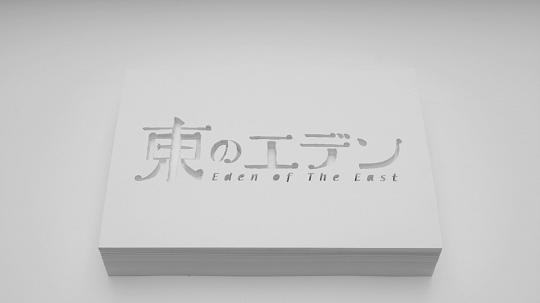
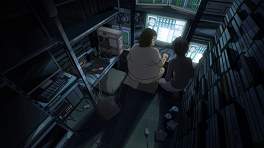
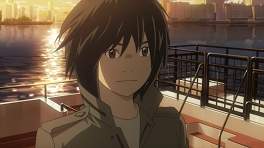
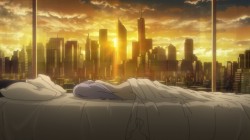
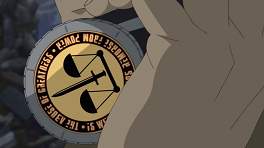
On to the social commentary point: I would hope that a push in that direction would not hurt it's reception based on that alone, but I guess some people would then lose interest (ugh). But I think the show's inability to properly capitalize on that social commentary is the real key here.
Now I'm understanding what you were getting in the post!